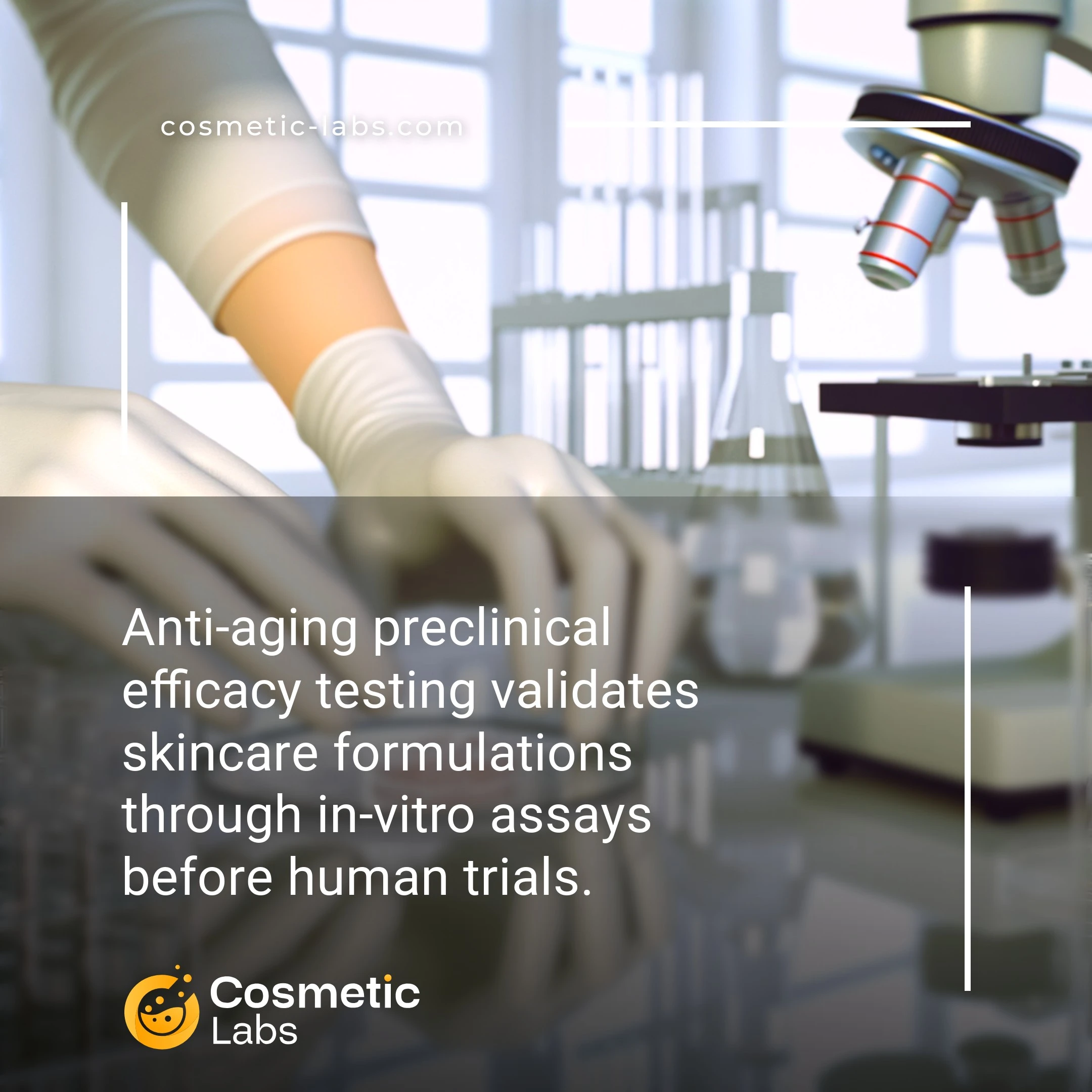Anti-Aging Preclinical Testing Services for Beauty Brands

What is Anti-aging efficacy testing?
Anti-aging preclinical efficacy testing services validate your cosmetic formulations through laboratory assessments before human trials. Labs measure collagen synthesis, elastin production, and cellular renewal rates using in-vitro models and biochemical assays. These tests provide quantifiable data on wrinkle reduction and skin firmness improvements, helping you build scientific claims that support regulatory submissions and marketing positioning.
Why do you need this service?
Cosmetic labs use anti-aging preclinical efficacy testing to validate wrinkle reduction claims, measure collagen stimulation levels, and assess skin elasticity improvements before market launch. These studies provide quantifiable data for regulatory submissions and marketing claims, helping brands avoid costly reformulations while building consumer confidence through scientifically-backed performance metrics.
Who provides Anti-aging efficacy testing services?
All cosmetic labs providing Anti-aging efficacy testing services
There is no company providing these services at the moment.
Anti-Aging Preclinical Efficacy Testing Services
Anti-aging preclinical efficacy testing validates your cosmetic formulations before market launch through controlled laboratory assessments. These services help beauty brands demonstrate product performance claims with scientific data, reducing development risks and supporting regulatory compliance.
Cell Culture and Molecular Testing
Labs use cell culture models to evaluate how your anti-aging ingredients affect skin cells at the molecular level. Fibroblast cultures test collagen production stimulation, while keratinocyte assays measure cellular renewal rates. These methods provide quantifiable data on ingredient bioactivity within 2-4 weeks.
Testing protocols include:
- Collagen synthesis measurement in dermal fibroblasts
- Elastin production analysis
- Antioxidant activity assessment
- Cell viability and proliferation studies
Results help you optimize concentrations and validate marketing claims with scientific backing.
Skin Model Testing Platforms
Three-dimensional skin models replicate human skin structure for realistic anti-aging testing. These tissue models evaluate wrinkle reduction, firmness improvement, and barrier function enhancement. Testing typically spans 14-21 days with multiple measurement points.
Available testing methods:
- Reconstructed epidermis models for barrier function
- Full-thickness skin equivalents for wrinkle assessment
- Melanocyte co-culture systems for pigmentation studies
- Sebocyte models for oil production analysis
Connect with specialized labs on our platform to design custom testing protocols that match your product’s specific anti-aging claims and target market requirements.
13 subcategories of Anti-aging efficacy testing services
There are no results matching your search
Practical Applications of Anti-Aging Preclinical Efficacy Testing
Anti-aging preclinical efficacy testing applications span multiple product categories and development stages, enabling brands to validate ingredient performance before costly clinical trials.
Peptide and Retinoid Formulation Validation
Labs use in vitro collagen synthesis assays to measure how peptide complexes stimulate fibroblast activity in controlled cell cultures. These tests typically run 72-96 hours and quantify collagen production increases of 15-40% compared to untreated controls. Retinoid formulations undergo keratinocyte proliferation testing to assess cell turnover acceleration without cytotoxicity.
Antioxidant capacity testing through DPPH and ORAC methods determines free radical scavenging ability within 24 hours. This data supports marketing claims about environmental protection and oxidative stress reduction.
Botanical Extract Screening and Optimization
Elastase inhibition assays evaluate botanical extracts’ ability to prevent elastin breakdown, with results showing 20-60% inhibition rates for effective anti-aging ingredients. Labs test extract concentrations from 0.1% to 5% to establish optimal dosing for maximum efficacy without irritation.
Hyaluronidase inhibition testing measures how plant-based compounds preserve hyaluronic acid levels in tissue models. Results guide formulation decisions for moisture retention and plumping effects in finished products.
| Test Method | Target Mechanism | Timeframe | Key Metrics |
|---|---|---|---|
| Collagen Synthesis Assay | Fibroblast stimulation | 72-96 hours | 15-40% increase |
| Elastase Inhibition | Elastin protection | 24-48 hours | 20-60% inhibition |
| DPPH Antioxidant | Free radical scavenging | 24 hours | IC50 values |
| Hyaluronidase Inhibition | HA preservation | 2-4 hours | % inhibition rate |
Connect with specialized cosmetic labs on our platform to access these anti-aging testing protocols and accelerate your product development timeline.

